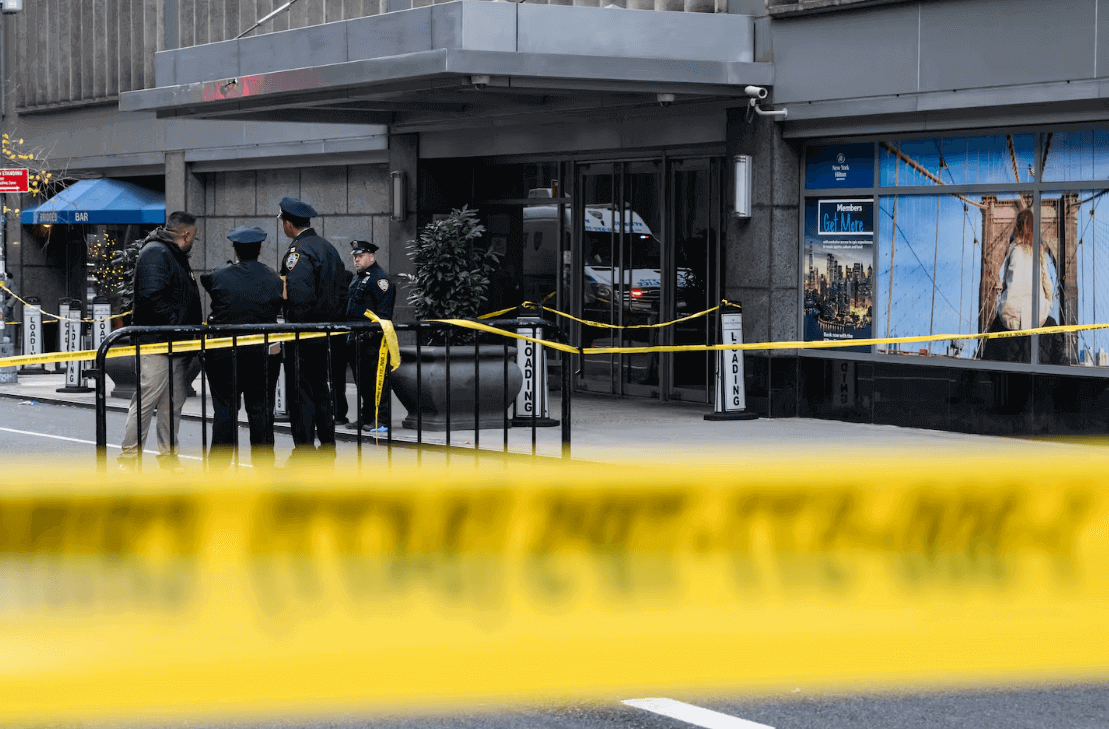联合健康保险首席执行官遇害,引发人们对医疗保健系统的不满

【中美创新时报2024 年 12 月 6 日编译讯】(记者温友平编译)健康保险公司的愤怒反映了人们“压抑的痛苦”。这次联合健康保险首席执行官遇害袭击是一场悲剧,为该国可怕的枪支死亡人数再添一笔。但它并没有引起同情,反而打开了社交媒体和在线论坛上对医疗保健系统的愤怒的闸门——该系统向人们收取世界上最高的费用,为获得医疗服务设置财务和官僚障碍,并使数百万人陷入债务。对此,《波士顿环球报》转载了其合作伙伴STAT记者Bob Herman 和 Tara Bannow的如下详细报道。
(这是一篇来自 STAT 的文章,STAT 是健康和医学新闻网站,是《波士顿环球报》的合作伙伴。有关相关报道,请访问 STAT)。
联合健康保险首席执行官 Brian Thompson 的定点清除已成为美国医疗保健时代精神的决定性时刻。
这次袭击是一场悲剧,为该国可怕的枪支死亡人数再添一笔。但它并没有引起同情,反而打开了社交媒体和在线论坛上对医疗保健系统的愤怒的闸门——该系统向人们收取世界上最高的费用,为获得医疗服务设置财务和官僚障碍,并使数百万人陷入债务。
社交媒体上的帖子从悲伤到冷漠再到喜悦,包括对汤普森去世的病态庆祝。这种洪流迫使全国各地的人们同时面对两个沉重的话题:杀戮的冷酷无情,以及对通过剥削美国人赚取大量金钱的医疗保健行业的根深蒂固的愤怒。

其中大部分发生在枪手动机有任何暗示之前。圣路易斯大学医疗伦理学副教授 Yolonda Wilson 说,人们认为有人因为工作而被迫杀死汤普森,这很能说明问题。Wilson 补充说,她代表的是自己,而不是她的雇主。
“我认为这说明了人们对这个国家的医疗保健的体验非常重要,”威尔逊说。“我认为这不仅仅是愤怒。我认为这是痛苦。我认为很多人都有压抑的痛苦,他们没有地方发泄。”
公众的不满从未如此强烈。最近的民意调查数据显示,医疗保健系统现在和 15 年前《平价医疗法案》生效前一样不受欢迎——当时,如果人们有任何预先存在的健康状况,保险公司可以拒绝为他们提供保险,而近 4900 万人没有保险。盖洛普周五公布的一项调查显示,“美国人对美国医疗保健质量的正面评价现在处于 2001 年以来的最低点”。
有几个因素导致了这种不满。大约 2500 万美国人仍然没有保险。数以千万计的人有医疗保险,但却负担不起高昂的检查、手术和处方药费用。保险公司试图根除不必要的程序,但有时这会导致不适当的护理延误或拒绝以及过多的文书工作。这些障碍不仅仅是一种麻烦——它们会对患者的健康产生真正的影响。
在接受治疗后,患者会收到大量他们不理解的医疗账单——他们不明白为什么他们的保险公司不为他们辩护,并担心医院和其他医疗服务提供者会将他们送去收款处或起诉他们。救护车的意外账单之类的事情仍然像以往一样常见,几乎所有人都认为这个问题应该得到解决。
这一切都是医疗保健系统的一部分,该系统预计今年将花费 5 万亿美元,进一步侵蚀工人的工资。
“这笔钱足以照顾所有人,”密歇根大学内科医生、教授马克·芬德里克 (Mark Fendrick) 说,他研究过改善医疗保险的方法。 “这些钱足以避免大量美国人因保险公司而受到不公正对待。”
警方尚未抓获杀害汤普森的凶手。新报道显示,枪手的子弹壳上刻有“拒绝”和“辩护”字样,这些字样与保险公司处理医疗索赔的方式有关。但它们无法证实其动机。
联合健康保险是一家保险公司,其母公司还拥有医师团体和一家大型理赔处理公司,多年来,该公司招致了大量的敌意。随着技术的发展,其技术也不断进步。STAT 此前报道称,联合健康保险和其姊妹公司 NaviHealth 已使用算法和人工智能来限制和拒绝对弱势老年人进行康复治疗。
联合健康保险在周四发布在其网站上的一份声明中表示:“自这起可怕的罪行发生以来的几个小时里,我们被大量善意和支持所感动。”
“我们联合健康集团将继续为那些依靠我们提供医疗保健的人提供帮助,”该公司表示。
公众对保险公司的蔑视并不是什么新鲜事,而且远远超出了健康计划的范围。
“在做研究时,我震惊地发现,人们从保险公司成立之初就一直憎恨保险公司,”罗伯特·伍德·约翰逊基金会的高级医疗政策官员凯瑟琳·汉普斯特德 (Katherine Hempstead) 说道,她曾写过一本关于美国保险业历史的书。
天主教健康协会 (Catholic Health Association) 是一个天主教医院和长期护理机构的行业组织,其负责人玛丽·哈达德 (Mary Haddad) 表示,暴力行为不应被纵容。
“人们必须把人与机构区分开来。这是丈夫。这是父亲。这是失去生命的人,”哈达德说道。“我们必须退一步思考,‘我们富有同情心的回应是什么?’”
最感到委屈的人往往是病情最严重的人。根据研究公司 KFF 的民意调查,健康状况较差、因此需要更频繁接受护理的人,对保险的喜爱程度远不及健康人。
泰·贝林格 (Ty Beringer) 就是其中之一。这位 30 岁的阿肯色州居民患有 1 型糖尿病。贝林格有一份全职工作,有医疗保险,所以他目前能够获得所需的胰岛素。但在大学期间和毕业后,他说他不得不定量使用胰岛素,以避免自付巨额费用。
贝林格在 X 上发帖称,联合健康保险等公司的拒绝和协议可能会让人们感到绝望。他在一次采访中表示,他认为对汤普森被杀的反应是人们“集体表达对一个行业的悲痛”。
“我同情布莱恩·汤普森的家人,但我也同情数百万因联合健康保险和整个医疗保健系统而分崩离析的家庭,”贝林格说。
对于圣路易斯大学的威尔逊来说,对联合健康保险的失望也是个人的。她原定于一年前接受手术,但这家保险公司在手术前两天撤回了批准。威尔逊回忆说,当她得知如果没有保险,这项手术将花费数万美元时,她哭了。幸运的是,联合健康保险只是缺少检查结果,她最终还是接受了手术。
威尔逊认识到,她的教育背景和一支倡导团队帮助她克服了障碍,但并不是每个人都有同样的特权。汤普森去世后,她决定在社交媒体上分享自己的经历,帮助人们了解她所说的联合健康保险对人们造成的伤害。
“虽然我并不为联合健康保险首席执行官在街上被枪杀而感到高兴,但我也不为此感到难过,”威尔逊在 X 上写道。她在一次采访中补充说,她的手术被取消,这似乎表明该公司“对从患者的角度看这件事并不十分感兴趣”。
莫妮卡·布莱恩特在 Triage Cancer 担任首席运营官期间每天都能看到这种愤怒情绪,Triage Cancer 是一家为癌症患者提供免费教育和法律咨询的非营利组织。
“人们觉得这个系统的运作方式本身就存在不公平,”布莱恩特说。“有医疗保险的人生病了,而公司、企业却可能成为他们获得所需医疗服务的障碍,有时这些医疗服务甚至可能挽救他们的生命。”
题图:12 月 4 日,调查人员在纽约希尔顿中城酒店外,联合健康保险首席执行官 Brian Thompson 在那里被枪杀,警方称这是一起公然的暗杀式谋杀。KARSTEN MORAN/NYT
附原英文报道:
Killing of UnitedHealthcare CEO brings resentment of the health care system to the fore
Anger toward health insurers reflects people’s ‘pent-up pain’
By Bob Herman and Tara Bannow Stat,Updated December 6, 2024
Investigators outside the New York Hilton Midtown, where Brian Thompson, the chief executive of UnitedHealthcare, was fatally shot in what police called a brazen, assassination-style slaying, on Dec. 4.KARSTEN MORAN/NYT
This is an article from STAT, the health and medicine news site that’s a partner to the Globe. For related coverage, visit STAT.
The targeted killing of UnitedHealthcare CEO Brian Thompson has become a defining moment in the zeitgeist of American health care.
The attack was a tragedy that adds to the country’s grim tally of gun deaths. But instead of eliciting sympathy, it opened the floodgates for an outpouring of rage, captured across social media and online forums, over the health care system — one that charges people the highest prices in the world, erects financial and bureaucratic barriers to getting care, and has plunged millions of people into debt.
Social media posts have ranged from mournful to apathetic to joyful, including morbid celebrations of Thompson’s death. That deluge has forced people across the country to grapple with two heavy subjects at once: the callousness of a slaying, and an undercurrent of deep-seated anger at a health care industry that makes a lot of money by exploiting Americans.
Much of this came before there were any hints about the shooter’s motive. People assumed someone was driven to kill Thompson because of his job, which is telling, said Yolonda Wilson, an associate professor of health care ethics at Saint Louis University. Wilson added that she was speaking for herself and not her employer.
“I think that says something really important about how people are experiencing health care in this country,” Wilson said. “I don’t think it’s just anger. I think it’s pain. I think a lot of people have pent-up pain, and they haven’t had a place to put it.”
The public’s dissatisfaction has never been higher. Recent polling data show the health care system is as unpopular now as it was before the Affordable Care Act went into effect 15 years ago — a time when insurers could decline to cover people if they had any number of preexisting health conditions and nearly 49 million people lacked insurance. A survey from Gallup released Friday reveals that “Americans’ positive rating of the quality of health care in the U.S. is now at its lowest point” since 2001.
Several factors have contributed to that resentment. Roughly 25 million Americans remain uninsured. Tens of millions of others have health insurance but can’t afford the high prices of tests, surgeries, and prescription drugs. Insurers have tried to root out unnecessary procedures, but that sometimes results in inappropriate care delays or denials and excessive paperwork. These barriers aren’t just a nuisance — they can have real effects on patients’ health.
After care is provided, patients are inundated with medical bills they don’t understand — perplexed why their insurer isn’t advocating on their behalf, and fearful that hospitals and other providers will send them to collections or sue them. Things like surprise bills from ambulances, a problem nearly all agree should be fixed, remain as common as ever.
It’s all part of a health care system that is projected to spend $5 trillion this year, eating further into workers’ wages.
“That’s more than enough money to take care of everybody,” said Mark Fendrick, an internal medicine doctor and professor at the University of Michigan who has studied ways to improve health insurance. “And that’s more than enough money to avoid this significant number of Americans who have felt wronged by their insurance company.”
Police have not caught the person who killed Thompson. New reporting shows the shooter’s bullet casings were inscribed with “deny” and “defend,” words associated with how insurance companies handle medical claims. But they don’t confirm a motive.
UnitedHealthcare, an insurer whose parent company also owns physician groups and a major claims processor, has caught a large amount of animosity over the years. Its techniques have advanced with technology. STAT previously reported that UnitedHealthcare and a sister company, NaviHealth, have used algorithms and artificial intelligence to limit and deny rehab care for vulnerable older adults.
In a statement posted to its website on Thursday, UnitedHealth said, “We have been touched by the huge outpouring of kindness and support in the hours since this horrific crime took place.”
“We, at UnitedHealth Group, will continue to be there for those who depend upon us for their health care,” the company said.
The public’s disdain for insurance companies isn’t new, and it extends far beyond health plans.
“In doing my research, it shocked me to learn the extent to which people have always hated insurance companies — from the very earliest days of the business,” said Katherine Hempstead, a senior health care policy officer at the Robert Wood Johnson Foundation, who wrote a book on the history of America’s insurance industry.
Mary Haddad, the head of the Catholic Health Association, a trade group of Catholic hospitals and long-term-care facilities, said violence should not be condoned.
“People have to separate out the person from the institution. This is a husband. This is a father. This is someone who lost their life,” Haddad said. “We have to take a step back and say, ‘What’s our compassionate response.’”
Those who feel most aggrieved often are the sickest. People who have more health conditions and therefore need to get care more frequently don’t like their coverage nearly as much as healthier people, according to polling from research firm KFF.
Ty Beringer is among them. The 30-year-old Arkansas resident has type 1 diabetes. Beringer has a full-time job with health insurance, so he’s currently able to get the insulin he needs. But there were points during and after college where he said he had to ration insulin to avoid the large out-of-pocket costs.
Beringer posted on X that the denials and protocols of companies like UnitedHealthcare could make people feel desperate. And he said in an interview that he views the responses to Thompson’s killing as people “collectively airing out their grief toward an industry.”
“I feel for the family of Brian Thompson, but I also feel for the millions of families who have been torn apart because of UnitedHealthcare and the health care system at large,” Beringer said.
For Wilson, of Saint Louis University, the frustration with UnitedHealthcare is personal, too. She was scheduled to undergo surgery a year ago when the insurer withdrew approval just two days in advance. Wilson recalls crying when she learned the procedure would cost tens of thousands of dollars without insurance. Fortunately, UnitedHealthcare was just missing test results, and she was able to have the surgery after all.
Wilson recognizes that her education and a team of advocates helped her manage the hurdle, but not everyone has the same privileges. After Thompson’s death, she decided to share her experience on social media to help people understand the harm she says UnitedHealthcare inflicts on people.
“While I’m not rejoicing about the UHC CEO being shot dead in the street, I’m not sad about it, either,” Wilson wrote on X. She added in an interview that her canceled surgery made it seem as if the company is not “terribly interested in how that comes off from a patient standpoint.”
The anger that’s erupted is something Monica Bryant sees every day in her work as chief operating officer at Triage Cancer, a nonprofit that provides free education and legal advice to cancer patients.
“People feel there is an inherent unfairness in the way that the system works,” Bryant said. “That someone who has health insurance gets sick and then it’s a company, a business, that can be the barrier to them accessing the care they need to sometimes save their lives.”

